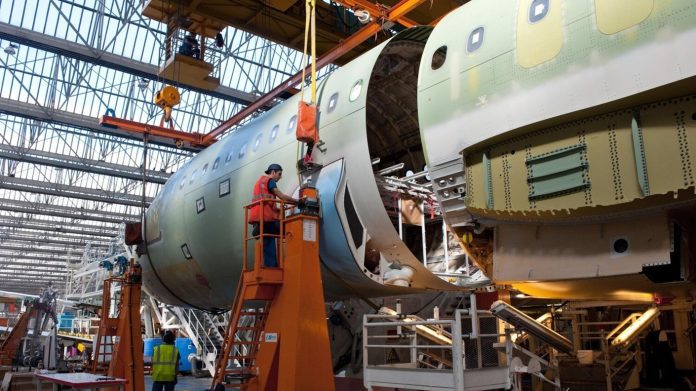Airbus is expanding its private 5G rollout with new networks in Hamburg and Toulouse, partnering with Ericsson. The deployments support factory digitalization, enabling advanced use cases like augmented reality, asset tracking, and predictive maintenance, as Airbus advances plans to replace Wi-Fi with 5G across all industrial sites globally.
In sum – what to know:
Private networks – Airbus has new private 5G networks in Hamburg and Toulouse, reinforcing its leadership in industrial 5G with partner Ericsson.
Factory digitalization – the 5G networks will power use cases such as augmented reality, 3D simulation, asset tracking, and predictive maintenance.
Global strategy – Airbus plans to replace Wi-Fi with 5G in all industrial areas; new 5G deployments are planned in the UK, Spain, the US, Canada, China.
Airbus has been true to its word, and about to complete two more private 5G networks in Europe, in Hamburg in Germany and Toulouse in France – as it said it would in these pages last November. Ericsson is its vendor partner for the work, as it has been since the start – and as it said it would continue with last time. The latest announcement confirms the European aviation and aerospace manufacturer as one of the leading industrial-side 5G protagonists in the market, in charge of its own private cellular (LTE) systems since 2018. It has five in production today – including the new Toulouse production site, scheduled to be completed in 2026 – and plans for at least a half-dozen more.
The news today, delivered by Ericsson, said Airbus has plans to deploy private 5G at additional sites in the UK, Spain, and the US – as also written before, when it referenced proceeding and pending proof-of-concept (PoC) work with partners in China and Canada, also, and a stretch-plan of 11 deployments. Ericsson said today (October 6) its projects in the US and Canada are pending. Orange Business is likely (unconfirmed) involved in the project in Toulouse, at least – as a preferred system integrator partner. The deployments in Toulouse and Hamburg are geared to “support its factory digitalization – from the operator’s workstation to the cabin”, said Airbus.
Use cases include 3D simulation, augmented reality, asset tracking (“traceability for parts”), and predictive maintenance (“for assets”). A statement said: “Private 5G forms the backbone of Airbus’ strategic transformation projects, enabling high-value industrial use cases such as IoT integration, intelligent management of critical equipment, real-time quality control, and collaborative robotics. With seamless, full-site coverage with private 5G, machines and operators on the production floor gain true mobility, boosting productivity, process agility, and end-to-end industrial control, all of which are key to realizing the full potential of Industry 4.0.”
The rollout has been blueprinted and telegraphed since November at least, when Hakim Achouri, 5G expert at Airbus, told RCR Wireless: “We have three sites live, in production [facilities] in Europe – in France, Germany, and Spain. We are extending to two more plants in Germany and France. The UK is planned for 2025… We are scaling up; seven thousand SIM cards have been delivered. Outside of Europe, we are in the initiation stage, awaiting launch of a first PoC with partners in the US and Canada. In China, we already have a PoC running but we are looking to standardise it and align it with our standard architecture in the EU.”
Back in 2022, in a separate conversation, Airbus maintained Wi-Fi remained of strategic importance. “Wi-Fi is not powerful enough or performant enough. Only cellular works inside the aircraft; [only cellular] connects everywhere, and any worker – across multiple manufacturing campuses”, it said. In the discussion at the end of last year, Achouri said the company’s plan is to replace Wi-Fi with 5G in “all industrial areas in the next three-to-five years”. Achouri echoed this in the Ericsson release. He stated: “Our objective is to migrate all our industrial networks towards 5G to ensure unified, ultra-reliable connectivity from the operator’s workstation to the aircraft cabin.”
He added: “The standardization and scalability made possible by this architecture allow us to replicate the solution easily across further sites in Europe and worldwide.” He discusses an 80/20 rule for cookie-cutter blueprints for Airbus to replicate and scale private 5G across its factory sites at some length in the last feature. Ericsson said its “built-in infrastructure automation” has enabled rapid deployment across Airbus’ operations – “significantly shortening implementation timelines compared to traditional setups”, it said. “This automation allowed Airbus to scale connectivity quickly and securely across multiple sites,” it added.
The solution “tailored to Airbus’ IT-tooling and cybersecurity requirements”, apparently. Airbus is managing the new networks itself, like it is all its others. Ericsson went on: “The design’s modular architecture and API-driven interfaces simplified onboarding into Airbus’ existing systems, accelerating time-to-value and reinforcing robust security controls.” Manish Tiwari, head of enterprise 5G in Ericsson’s enterprise wireless solutions business, commented: “Our collaboration with Airbus embodies the alliance between technological innovation and industrial excellence.” The pair have joint R&D around “connected cabins, 6G, and non-terrestrial networks (NTN)”, they said.
RCR Wireless’ coverage of Airbus’s Industry 4.0 adventures with 5G are worth following, variously summarised at the top of the 2024 interview.

